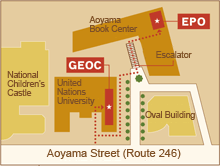Overview
The vital role of Micro, Small and Medium Enterprises (MSMEs) as part of development of the Indonesian economy has been a potent factor in Indonesia’s economic growth, yet their intermixed presence in residential areas poses another challenge for managing and monitoring their waste management. Most MSMEs face difficulties in managing their overall resources so as to acquire efficiency in production, due to lack of financial resources and inefficient equipment. Thus, the government has to encourage such enterprises to implement cleaner production by practicing the 4 R’s approach – to reduce, reuse, recycle and recover. Since 1993, the Indonesian government, through the Ministry of Environment, has been developing four schemes for Environmental Soft Loans, namely Pollution Abatement Equipment, Industrial Efficiency, Pollution Control Phases I and II, and Debt-for-Nature Swaps.
The types of investment that can be funded by this program include pollution prevention equipment (cleaner technology), wastewater treatment plants, air pollution controls, solid waste treatment plants, consulting services related to civil construction environment, etc. Implementation of the program involves financial institutions like Indonesia’s Bank Central Asia, Bank BNI, Bank Mandiri, Bank Danamon, Bank BII, Bank of Central Java (Java BPD), BPD Bali, Bank Jabar Banten (BJB Bank), Regional Development Bank of West Sumatera (BPD of West Sumatera or Bank Nagari), Indonesian Export Financing Institution (LPEI), BPD of West Kalimantan, BPD of East Kalimantan, BPD of Yogyakarta, Bank Niaga and Bank Syariah Mandiri.
Through 2011, the program had benefitted 363 enterprises – 84 of them large companies and 279 being micro, small and medium enterprises. Some examples are as follows: wood processing companies, recyclers of plastics, food producers, hospitals, organic fertilizer producers, alternative energy producers, textile manufacturers, and other industries. Types of environmental investment which have been financed include the installation of solid waste and waste water treatment facilities, installation of air pollution control systems, waste recycling, cleaner production facilities and alternative energy generation, including renewable energy.
Points about the partnership
-The experience of using environmental soft loan programs in promoting cleaner production investments in Indonesia has been positive. Analysis demonstrates that such incentive schemes can speed up investment in MSMEs in technologies that reduce the use of resources;
-Some banks have realized the financial benfits of cleaner production, but overall in the current cost structure of most MSMEs in Indonesia, some level of support from the government and donors is still necessary to stimulate the market for environmental investments.
Category
□Sustainable Financing
Theme
□Environment Soft Loan towards effective waste management
Actor
Ministry of Environment
Partners
Financial Institutions, Banks, Indonesia Export financing institution/ LPEI

















